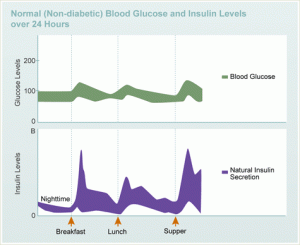What is the normal blood sugar level?
What is the normal blood sugar level? This is one of the most important questions for diabetics. Diabetics have to know accurate measurements on their blood sugar levels or risk having to high blood sugar and damage their body. Diabetes is a disease were the body produces to little of the chemical insulin. Insulin is a chemical created by the pancreas; the job that does is in turning the glucose (sugar) in the body into fuel that the body can use.
When insulin is not created in high enough amounts, glucose soars. This has many health effects that permanently damage the body, such as:
- nerve damage,
- blindness,
- heart disease,
- and kidney failure.
Knowing what is the normal blood sugar level, is absolutely vital for the survival of the diabetic. Hypoglycemia is where too much insulin is created and the body needs more fuel. This can result in fainting, dizziness, confusion, and other serious side effects.





